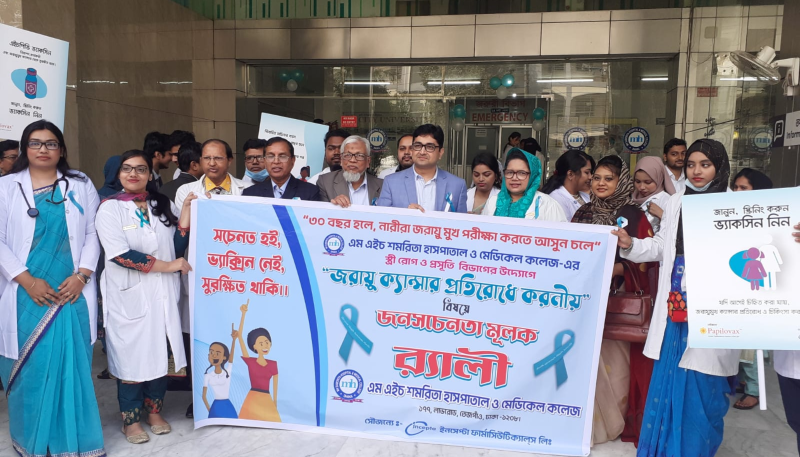Home ›› 31 Jan 2023 ›› Back

Cervical cancer, responsible for the second highest death among the female patients in the country, is fully preventable if the government underlines its determination to take proactive measures and build awareness among parents, speakers at a programme said.
They made the observation at the event organised by MH Samorita Hospital and Medical College on Sunday afternoon, marking the Cervical Cancer Prevention Week which was observed from January 23-29.
As part of the programme, they screened 100 girls and women and provided them with cervical cancer vaccines. A seminar was also held on the issue. According to the data from the International Agency for Research on Cancer (IARC), 2020 showed that every year 8,268 women are diagnosed with cervical cancer and 4,971 die of the disease.
It means nearly 60 per cent of the patients infected with cervical cancer die of the disease and the country is registering one death on average in every two hours.

However, physicians said the number is much higher and could be responsible for as much as one death in every hour.
Dr Bilkis Parvin, a professor at gynae and obs department of the medical college hospital, told The Business Post that most of the patients struggling for life come to receive treatment only after cancer reaches an advanced stage.
The symptoms of the disease if very much similar to one female are going through their time of menstruation. Syndromes for the disease are vaginal bleeding after intercourse, between periods or after menopause. Watery and bloody vaginal discharge that may be heavy and have a foul odor, pelvic pain or pain during intercourse could be felt as well.
Dermatologist Prof M U Kabir Chowdhury said cervical cancer is a curable disease if it is detected at an early stage. Vaccination for all, including risky groups, and end to early child marriage could prevent the risk of cervical cancer.
According to IARC, Bangladesh has a population of 58.9 million women aged 15 years and above who are at risk of developing cervical cancer.
Physicians said that those who start intercourse within a year after menstruation, early sexual exposure or start sexual live at or before the age of 16, became a victim of child marriage, multiple sexual partners, partner having HPV and having family history of any sort of cancer.
So, everyone who has these risk factors should start screening and should continue it till the age of 29 every year and if everything goes well after 30, it should be once in three years, they said.
Head of Department of Gynae and Obs of the medical college Prof Dr Nahala Bari said that to prevent infection and death fully from the country, people need to avoid early sex exposure and also child marriage, have safe sex, cervical examination (via test or pep test), human papillomavirus (HPV) DNA test for male and 100 per cent vaccination for the girls and women aged between 14 and 29.